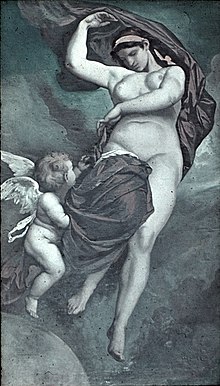Gaea, by Anselm Feuerbach (1875)
Gaia Theory
Gaia Theory, first postulated by James Lovelock, a chemist, and freelance advisor to NASA, in the 1960's. His support of NASA in deciding if there was life on Mars, led him to believe that Mars did not have the proper atmosphere for life--and that because Earth did, perhaps Earth itself is a living organism. The first point of evidence for Gaia Theory is that though the Sun has grown in strength, the Earth itself has not become significantly hotter over the period of about 4.5 millions years. Instead of increasing in temperature, the Earth compensated for the incoming heat by creating a more complex atmosphere that could bare the intensity of the Sun. In turn, this more complex atmosphere created an environment where more varied life forms could thrive.
The example given to simply Gaia theory is the "Daisyworld Simulation." Imagine the world is populated by two types of daisies: black ones which absorb heat and become warmer, and white ones which reflect the heat of the sun and remain cool. Thus, dependent on the amount of light and the temperature in the environment, the daisies complement eachothers' ability through creation of homeostasis.
Opposition of the Gaia theory deem it as excessively teleological. Many critics of the theory respond with a more evolutionary perspective, purporting that each specie and each creature, plant, substance, acts in accord with its own survival. Thus, plants do not give off oxygen to support animal life, but simply as a random byproduct of their own processes.
While the Gaia Theory appears to have some pitfalls, mainly that it sees homeostasis where there may not be any--we can simply see that human and plant life live in tandem and are complementary. Whether or not the Earth is alive or not is a philosophical inquiry, largely dependent on what is considered "life" in the context of this question. Therefore, as someone who is not a scientist, I don't see the need to apply scientific principles to these large, existential questions. Rather, we can see quite plainly, the ecosystems arise and are supported through the complementary actions of their inhabitants. While the question of evolution could be a pitfall of this theory, I don't see any reason for chaos and order to cocreate the existence of Earth. While chaos may drive us forward, it appears that homeostasis preserves the life that arises.
Our Original Ancestors May Have Come from Europe
Wherever our ancestors came from originally, is wholly uninteresting to me. We continue to find older and older skeletons in different regions of Earth, and each time, claim that it must be the oldest.

I like your comparison of Gaia theory to homeostasis. It makes sense that the earth and its inhabitants exist as a large symbiotic system. Just as homeostasis maintains order in the body through a self regulating system, Gaia theory proposes that it is the macrocosm of smaller environmental microcosms.
ReplyDelete